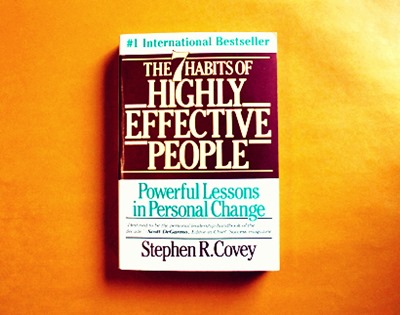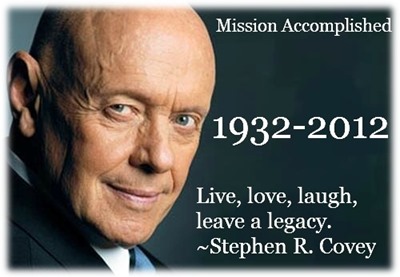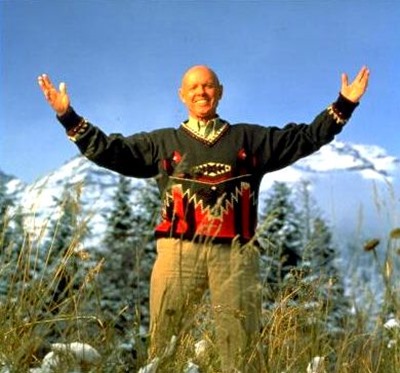Top 3 Work-Smart Books: 7 Habits by Stephen Covey and How to Read it Right
Before getting into the series of work-smart books, it’s essential to first discuss the notion of “work”. “Work / Life balance” is a strange term for me, even stranger as a competence, because I consider them non-separable. Work falls under Life. What doesn’t fall under life?
There are dangers in seeing Work and Life as two balls to juggle with – paying a little more attention to one and you will drop the other; or as two sites of the scale – one goes up, the other goes down. Think about it for a little.
Can life be happy if work sucks? After 8 hours of suffering from boredom and stress, I will go home and mistreat my family as to mirror my suffering, no matter how much I love them.
Can work be successful if life sucks? After a fight with my lover or my parents, I will show up at work depleted, unable to contribute my best, mistreat my colleagues, no matter how much I love my job.
Work is one of many Life’s elements such as Relationship, Family, Community, Friendship. They are interrelated, interdependence. True wisdom comes when we understand “how the various parts and principles apply and relate to each other… a gestalt of oneness, and integrated wholeness,” in the words of Stephen Covey.
A bad human being makes an bad employee. A unfulfilling job summons in a good man his demons. Learning how to work is futile if we are ignorant of how to nurture other aspects. And good books about work smart will positively influence other facets of your life.
This is the first article of “Top 3 Work-Smart Books”. They are my personal choices, each approaches the puzzle of “work better – live better” through different angle, depth, and dimension. Combined, they are your roadmap and guidebook to become not only a better employee, but also a better person.
 7 Habits of Highly Effective People by Stephen R. Covey
7 Habits of Highly Effective People by Stephen R. Covey
This is a book so big it’s intimidating to write a review about. 7 Habits claims its place in my 3 most influential books for its wisdoms in personal transformation. It also tops this list because of Covey’s holistic approach to effectiveness.
7 Habits is a guidebook so profound and timeless that it will be wasteful to simply check it off your reading list after you’ve done. I re-read it 3 times, and open a chapter once in a while. These reads never fail the task of revealing new truths and expanding my understanding. For the record, I just re-read the chapter on Habit 2 “Begin with the End in Mind” this morning, and came across a small passage that deeply touched me:
One man asked another on the death of a mutual friend, “How much did he leave?” His friend responded, “He left it all.”
It’s easy to remember the name of the habits. For instance, say “Begin with the End in Mind” aloud when it dawns on you, once in a while, that you are dabbling around without the slightest idea of where you are headed. But that is not real reading. A book like this deserves a good reader.
In order to instill these habits inside you, you need to understand 3 things:
1. What is this habit all about? The logics behind this habit; the elements that construct it; the contexts and the examples that give light to it.
2. What is Covey’s overarching approach to personal transformation? His conviction about the superiority of Character Ethics over Personality Ethics; his belief that real improvement starts from Inside-Out; his assertion on upward spiral growth; his philosophy on Production – Production Capacity; and so on.
3. How do all 7 Habits related? The interrelation, interdependence between each habits, for example: while Habit 1: “Be Proactive” says that “You are the creator”, Habit 2: “Begin with the End in Mind” whispers “Create now, here is how…”; Habit 7 encircles and enable the rest of the habits to flourish; Habits 1-2-3 belongs to Private Victory, while Habits 3-4-5 belongs to Public Victory, at the same time, Private Victory is prerequisite to Public Victory.
I would recommend 7 Habits to all literate people, from the stay-at-home mom in the country side of Vietnam and the CEO of a tech giant in Silicon Valley, and everyone in between. I would also recommend those who have read it to re-read it. Do it today.
There are so many hidden gems in this book that each re-read is a new discover. Take Covey’s point of view regarding “center” for instance. He wrote that whatever is at the center of us will be the source of our security, wisdom, guidance and power. Security is our sense of worth; Wisdom is our capability to be balanced and whole; Guidance is the clarity of direction; Power is the willpower to act and persevere. The development of these elements results from what kind of center we are living – whether by default or by choice: spouse-centered, work-centered, an so on. This philosophy is punctuated by an emphasis on being Principle-Centered. There are many more wisdoms like this. Each of them so profound that it can stand on its own, or even be expanded and turned into another book.
Covey’s talent in telling stories makes 7 Habits not only an intelligent read, but also a moving tale sprinkled with witty, laugh-aloud remarks. His personal stories put us the readers in his gaze so that we can see what he sees and experience his thought/feeling process. This is where true understanding comes from. Besides, the stories help us to respect Covey’s characters. One cannot deliver values to others without first being the values. Covey was.
If I must choose one best thing that Covey and this mind-altering book gave me, it would be the unwavering belief in the importance of good characters. Like a cigarette company is a cigarette company, no matter how much donation it gives to the community; a person without good characters is remains a person without good characters, no matter how well he is at “winning friends and influence people”.
Now I’d like to leave you with a quote from David Starr Jordan, which Covey used to begin Part 1 of his legendary book:
There is no real excellence in all this world which can be separated from right living.

Learn to become a better reader and expand your knowledge with other articles on BookWorm Wednesday
Come back next week for the other 2 on my top 3 work-smart





